Page 1 of 1
Green Filters to Combat Chromatic Aberration
Posted: Wed Apr 27, 2016 1:13 am
by rnabholz
Recent experiences capturing the fine details in cleaned diatoms frustules left me frustrated. The effect of chromatic aberration from my achromatic objectives was having more than just an aesthetic effect with their red and cyan colored fringes, it was also affecting my ability to get the sharpness I was used to seeing.
In order to reduce the objectionable color fringing, I decided to convert the images to grayscale, hoping that would improve the sharpness as well. In the discussion that followed, Gekko correctly pointed out that the effect of the fringing would remain even after the color was eliminated, and so would not improve sharpness.
He went on to suggest that I try a green filter to counter the CA. Of course the resulting images would be colored green, but since the aspect of interest in this subject is its structure, and as it is predominately colorless, converting to grayscale would take care of the green.
As it happens, I have a filter in my astronomy kit that would be suitable for experimentation. It is a #56 green filter, rather a dark green, but at hand and that made it the choice for the job.

- IMG_20160425_194142-600x808.jpg (92.9 KiB) Viewed 10719 times
I would shoot the same subject, with and without filter, using both the 40x and 100x oil. I shot for stacks, with the same number of images for both filtered and unfiltered - 7 each for the 40 and 8 each for the 100.
I then processed the stacks using identical parameters in CombineZP. I did all methods, and in each case the Pyramid Weighted Average produced the best image.
I resized the resulting images to 1024 on the long side, made adjustments to levels and applied unsharp mask using identical parameters. Below are the results, starting with the 40x
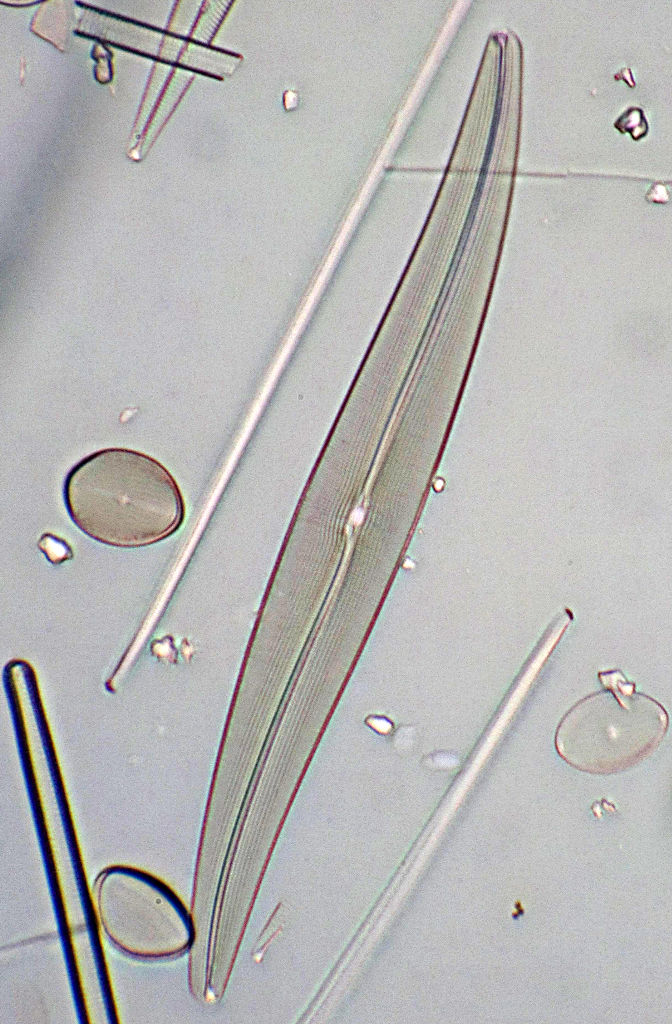
- 40X Brightfield Natural Coloration
- BF40Natural.jpg (150.03 KiB) Viewed 10735 times
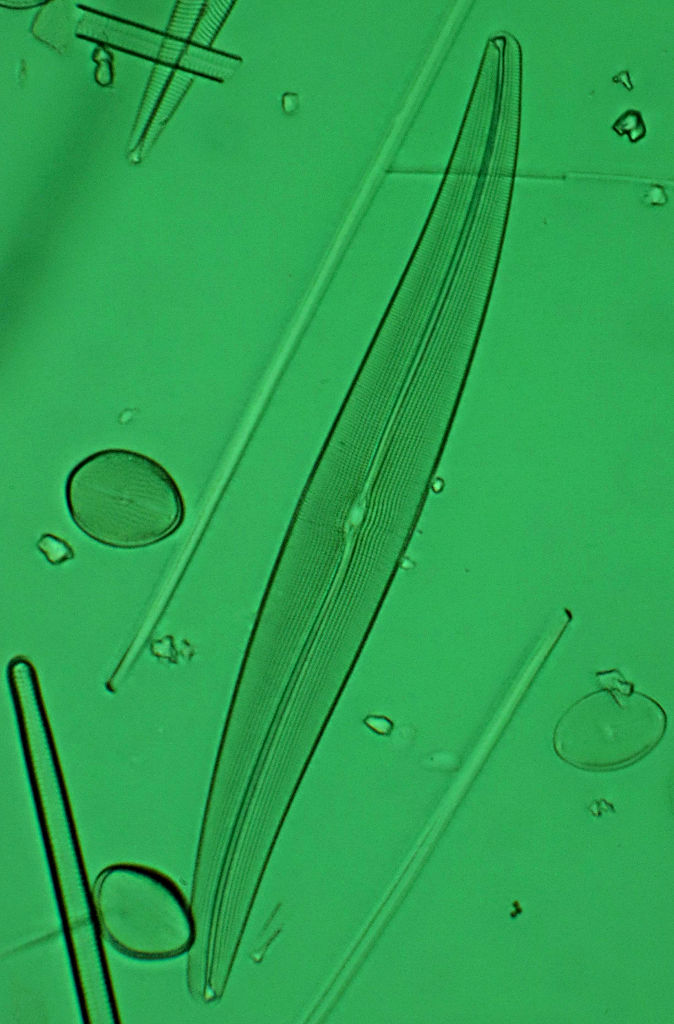
- 40x Green Filtered
- Green40Natural.jpg (96.17 KiB) Viewed 10735 times
And now the same images converted to grayscale
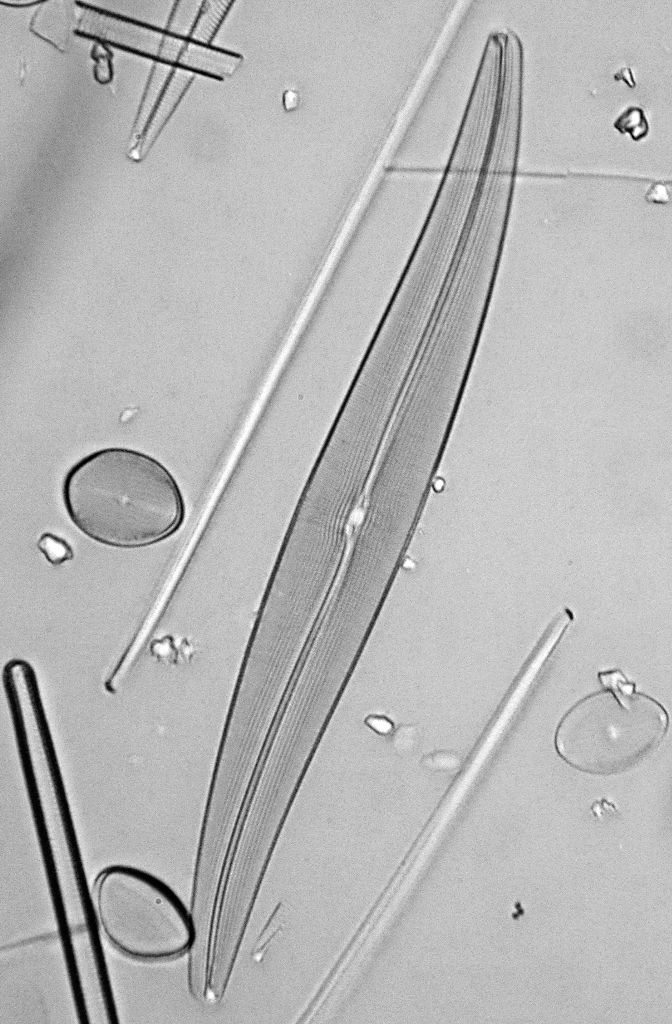
- 40x Brightfield coverted to Grayscale
- BF40Gray.jpg (119.77 KiB) Viewed 10735 times
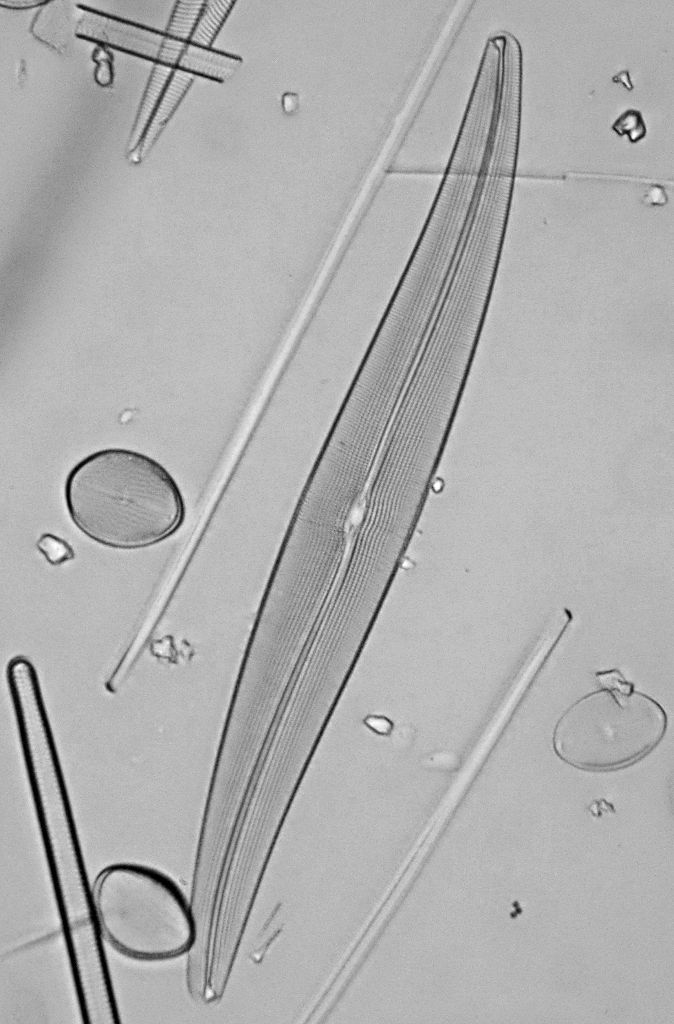
- 40x Green Filtered converted to Grayscale
- Green40Gray.jpg (91.36 KiB) Viewed 10735 times
Re: Green Filters to Combat Chromatic Aberration
Posted: Wed Apr 27, 2016 1:21 am
by rnabholz
Now on to the 100x
First the Natural and Green filtered versions
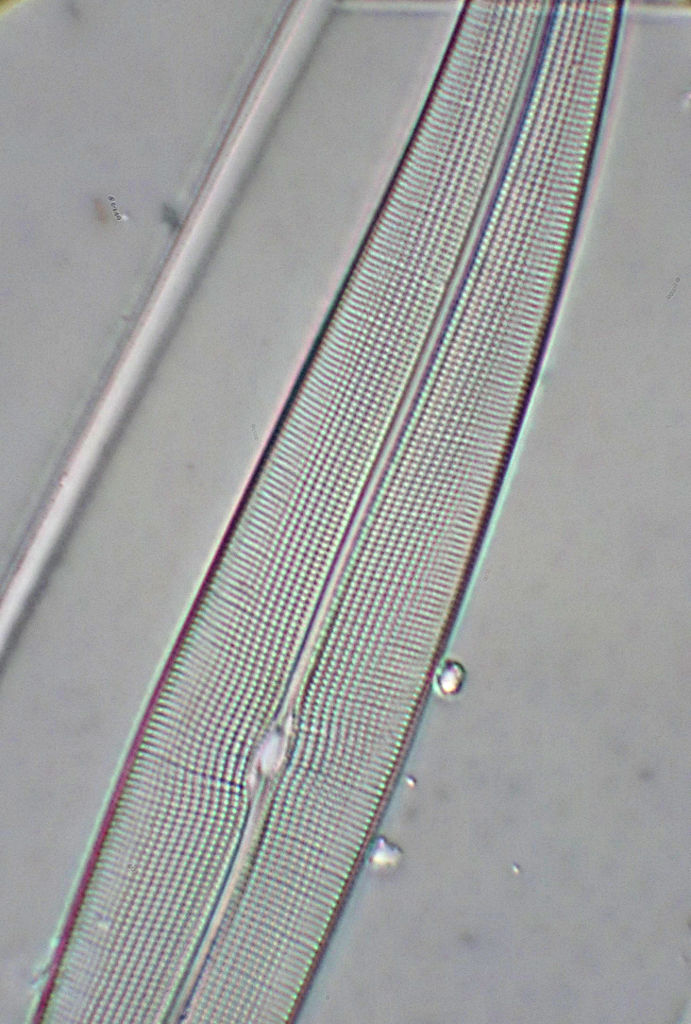
- 100x Natural coloring
- BF100Natural.jpg (138.39 KiB) Viewed 10733 times
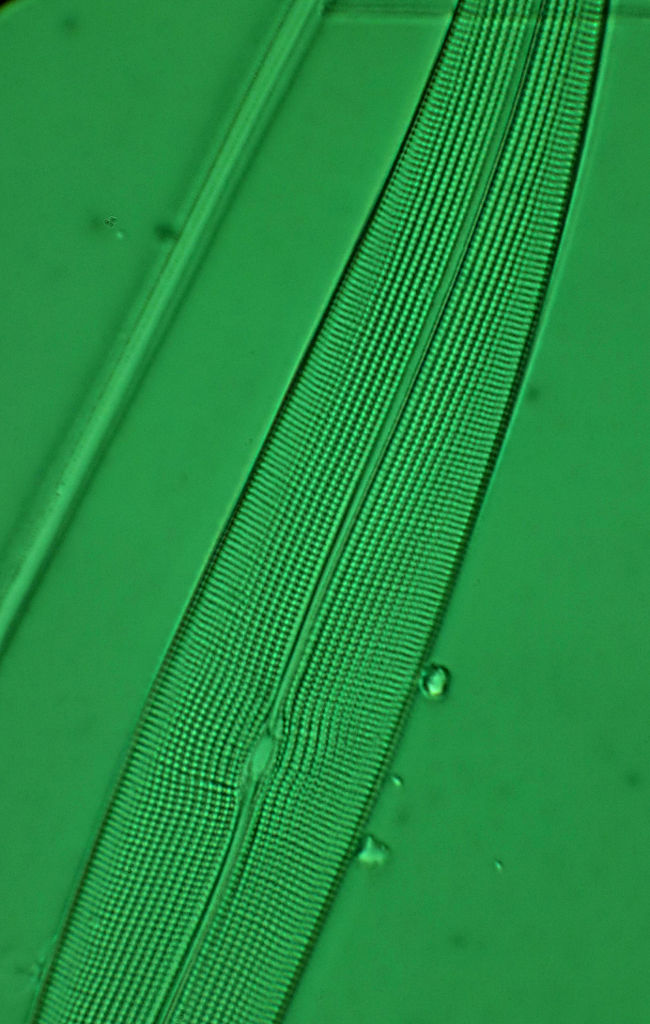
- 100x Green Filtered
- Green100Natural.jpg (117.18 KiB) Viewed 10733 times
And now the Grayscale versions
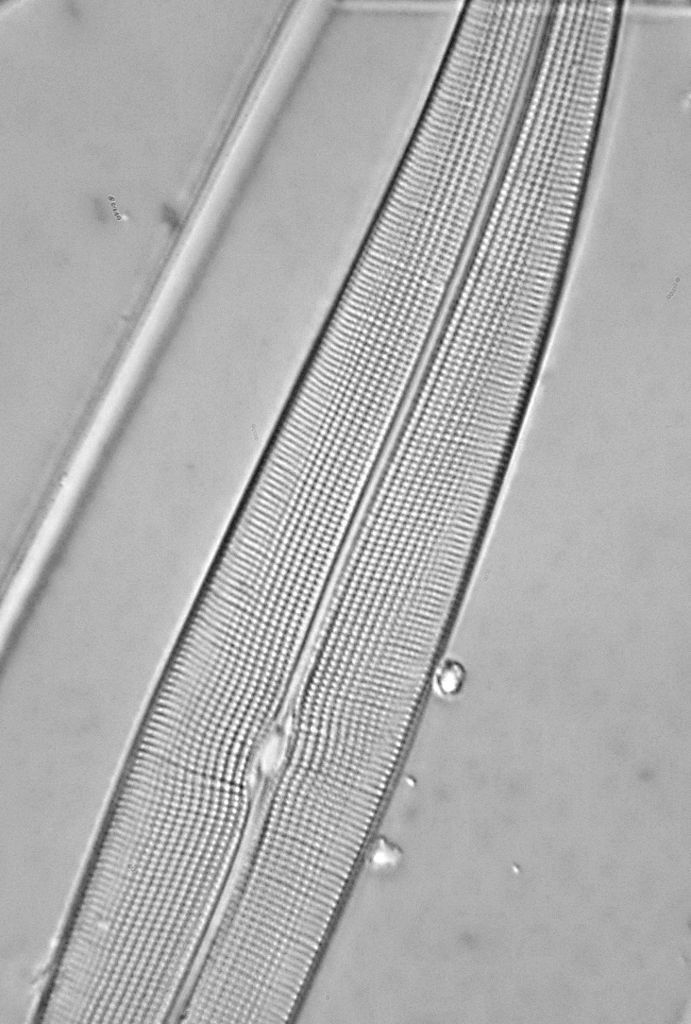
- 100x Brightfield converted to Grayscale
- BF100Gray.jpg (103.64 KiB) Viewed 10733 times
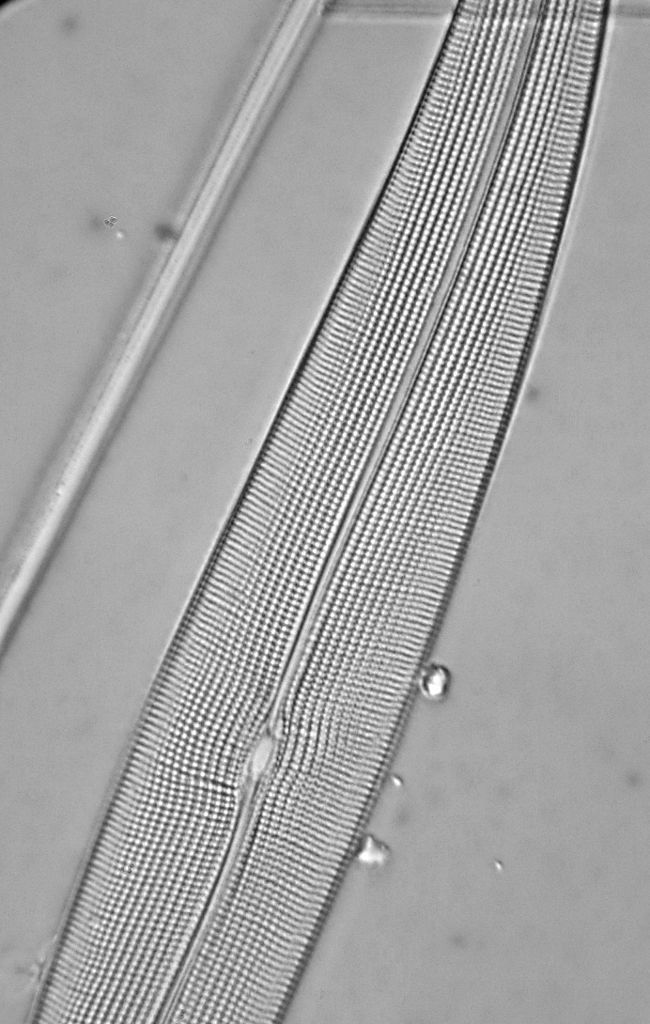
- 100x Green converted to Grayscale
- Green100Gray.jpg (100.85 KiB) Viewed 10733 times
To my eyes, the green filtered images are sharper in every form, to a fairly significant degree. No doubt that the stacking helps create the impression of improved sharpness over single frames, but the green filter's ability to reduce the spreading of the light by the achromatic lenses definitely brings me closer to the desired outcome that I am looking for with these images.
All of this accomplished with a filter intended for other purposes, I understand that there are filters designed specifically to attack the CA. Those would likely take things even further in a positive direction.
I welcome your comments, insights, suggestions.
Rod
Re: Green Filters to Combat Chromatic Abberation
Posted: Wed Apr 27, 2016 1:38 am
by zzffnn
Wow, that is a significant improvement! Much more than I expected. Thank you very much, Rod. I always enjoy your comparisons. I will start using my green filter with achromats from today on.
Re: Green Filters to Combat Chromatic Abberation
Posted: Wed Apr 27, 2016 3:09 am
by rnabholz
zzffnn wrote:Wow, that is a significant improvement! Much more than I expected. Thank you very much, Rod. I always enjoy your comparisons. I will start using my green filter with achromats from today on.
Thanks zz. Had to see for myself, glad to have the company.
It really is a significant difference. Nice to have this arrow in the quiver.
Thanks for the interest.
Rod
Re: Green Filters to Combat Chromatic Abberation
Posted: Wed Apr 27, 2016 4:05 am
by 75RR
Nice comparison.
I know I have already published this link at least a couple of times in this forum,
what can I say, every time the subjects it covers come up I just can't resist the impulse.
http://www.microscopy-uk.org.uk/mag/ind ... -test.html
Re: Green Filters to Combat Chromatic Abberation
Posted: Wed Apr 27, 2016 5:59 am
by billbillt
Hi Rod,
Thanks for posting this.. It was very interesting to discover that the green filter made so much difference..
BillT
Re: Green Filters to Combat Chromatic Abberation
Posted: Wed Apr 27, 2016 6:21 am
by glennbech
That's a significant improvement in sharpness. Try to count the vertical lines going through the specimen at 40x! ... And look at how defined he pearl structure is at 100x with the green filter!
But... Wouldn't it be better to use a violet filter, meaning a green absorbing filter? Then you would get red and blue light focused. More light is better, right?
Borrowing from Astro Photography; you could also experiment with taking 3 shots (Red, green, blue) and combine them to a single image afterwards. You would then have a "poor/clever mans" apo image

I love "shoestring" stuff, and love to get max out of cheap gear, it's something that I will try sooner or later.
Edit: Thinking about this some more: in practice, RGB imaging for microscopy would be very difficult. You would have to manually refocus the Green image, and hit the exact focal plane of the red and blue. By eye....
Re: Green Filters to Combat Chromatic Abberation
Posted: Wed Apr 27, 2016 9:55 am
by gekko
Rod, you waste no time! I'm amazed that you've already done all that. And I think the results are as you describe:: clear improvement.
glennbech, you are right that a blue or violet filter will give better resolution: the shorter the light wavelength the better the resolution, so UV light will give significantly better resolution than visible light. However, green light gives the best overall image quality because achromatic objectives are corrected for spherical aberration for green light (546 nm). In the case of phase contrast, the phase plate in the objective is also designed to give 90 degrees phase shift for green light, where they also give their best performance.
Re: Green Filters to Combat Chromatic Abberation
Posted: Wed Apr 27, 2016 1:20 pm
by rnabholz
Thanks 75.
The article is a good read, just keep on posting it. ;^)
Re: Green Filters to Combat Chromatic Abberation
Posted: Wed Apr 27, 2016 1:22 pm
by rnabholz
billbillt wrote:Hi Rod,
Thanks for posting this.. It was very interesting to discover that the green filter made so much difference..
BillT
Thanks Bill.
It is nice when the results are so conclusive so as to leave little doubt.
Rod
Re: Green Filters to Combat Chromatic Abberation
Posted: Wed Apr 27, 2016 1:51 pm
by rnabholz
glennbech wrote:That's a significant improvement in sharpness. Try to count the vertical lines going through the specimen at 40x! ... And look at how defined he pearl structure is at 100x with the green filter!
But... Wouldn't it be better to use a violet filter, meaning a green absorbing filter? Then you would get red and blue light focused. More light is better, right?
Borrowing from Astro Photography; you could also experiment with taking 3 shots (Red, green, blue) and combine them to a single image afterwards. You would then have a "poor/clever mans" apo image

I love "shoestring" stuff, and love to get max out of cheap gear, it's something that I will try sooner or later.
Edit: Thinking about this some more: in practice, RGB imaging for microscopy would be very difficult. You would have to manually refocus the Green image, and hit the exact focal plane of the red and blue. By eye....
I agree, The starkest difference for me on the 100x is the line of fine dots along the right edge of the central nodule. In brightfield they nearly disappear, but the in the green filtered image they are very well defined.
I think Gekko answered your technical questions much better than I ever could, so I will leave him to it.
Thanks for the interest
Rod
Re: Green Filters to Combat Chromatic Abberation
Posted: Wed Apr 27, 2016 1:59 pm
by gekko
rnabholz wrote:All of this accomplished with a filter intended for other purposes, I understand that there are filters designed specifically to attack the CA. Those would likely take things even further in a positive direction.
Rod, I think you are referring to the interference green filter that I mentioned in my PM: I just want to clarify that the green filter you used is just fine. The advantage of the interference filter (which is not specifcally a "microscope filter) is that it has a narrower bandwidth, so my guess is that it would give somewhat better results, although I doubt that the improvement would be dramatic (at least by my guess). It would probably also be better for your telescope

.
Re: Green Filters to Combat Chromatic Abberation
Posted: Wed Apr 27, 2016 2:07 pm
by zzffnn
I did a very casual visual (eyepiece only) comparison with and without green filter, with an achromat. At the time, I concluded that difference is not dramatic. However, eyepiece only non-stacked comparison is very different than stacked image comparison viewed on a 1080p screen. As you can see from Rod's excellent results.
Just a note, so other people shouldn't give up with the green filter so quickly, if they don't see big difference visually at eyepieces.
Re: Green Filters to Combat Chromatic Abberation
Posted: Wed Apr 27, 2016 2:12 pm
by rnabholz
gekko wrote:Rod, you waste no time! I'm amazed that you've already done all that. And I think the results are as you describe:: clear improvement.
You piqued my curiosity, so the experiment moved up the project list quickly.
Regarding the filter, if you think the difference would be negligible, I will stand pat with my Astro filter. I don't need to invent ways to spend more money on this stuff. ;^)
As always, thanks for the pointers and interest.
Re: Green Filters to Combat Chromatic Abberation
Posted: Wed Apr 27, 2016 2:14 pm
by JimT
Rod, great and enlightening comparison. Big improvement.
Re: Green Filters to Combat Chromatic Abberation
Posted: Wed Apr 27, 2016 2:20 pm
by rnabholz
[quote="zzffnn"]I did a very casual visual (eyepiece only) comparison with and without green filter, with an achromat. At the time, I concluded that difference is not dramatic. However, eyepiece only non-stacked comparison is very different than stacked image comparison viewed on a 1080p screen. As you can see from Rod's excellent results.
Just a note, so other people shouldn't give up with the green filter so quickly, if they don't see big difference visually at eyepieces.[/quote]
Good points zz.
The filter that I used made the visual experience fairly dark, which may also make a difference in perception of its effectiveness visually.
While the only negative effect of this filter for imaging was longer shutter speeds, A lighter shade of green would probably be a better choice if the use was to be primarily visual.
Re: Green Filters to Combat Chromatic Abberation
Posted: Wed Apr 27, 2016 7:01 pm
by rnabholz
JimT wrote:Rod, great and enlightening comparison. Big improvement.
Glad you found it interesting.
Thanks Jim
Rod
Re: Green Filters to Combat Chromatic Abberation
Posted: Wed Apr 27, 2016 8:54 pm
by rnabholz
I just now realized that I misspelled "aberration" in the TITLE of this thread.
Nothing like announcing to the world that you are a moron and using a billboard to do it! DOH!!!
I am sure the internet will forget in a week or two....
Sew pleeze xsept mie senseer apoligee. I will tri tou bee moor karephul in the fuchure.
Re: Green Filters to Combat Chromatic Abberation
Posted: Thu Apr 28, 2016 6:44 am
by billbillt
Hi Rod,
I don't think anyone had noticed... Now everyone will!...

BillT
Re: Green Filters to Combat Chromatic Abberation
Posted: Thu Apr 28, 2016 11:17 am
by rnabholz
You might be right Bill, but that's OK. Sometimes you just have to laugh... ;^)
I have corrected the spelling now after making my confession.